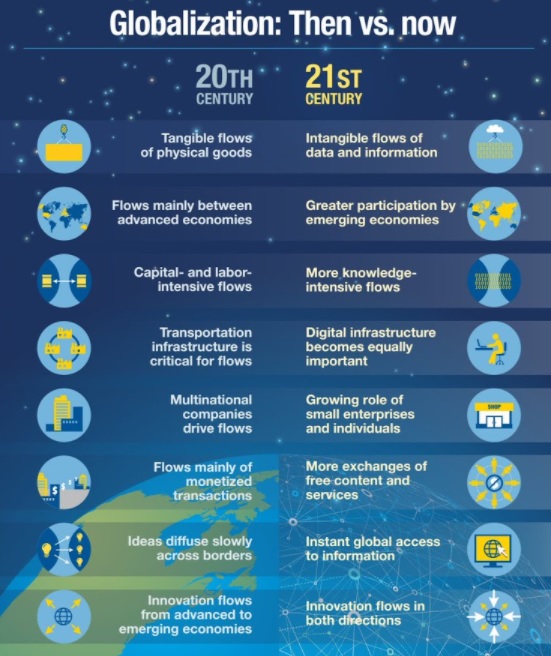
Digital Globalization and How It Affects Businesses
Today’s world is connected more than ever. The way of how people and things are linked together has changed greatly for the last two decades. First stages of globalization process were associated with material goods because goods were easer to sell across the boarders compared to services. Thanks to digital globalization, now it is getting easier to sell jobs and services worldwide. And this fundamental change is bringing huge opportunities for the most competitive citizens of different nations. Digitalization trends along with the coronavirus realities demonstrate that the digital shift will happen faster than expected. International bandwidth has multiplied because the flows of data, information, communication, ideas, and transactions continue to rise. The implementation of digital trends has opened the doors to developing countries, small companies and start-ups. Any individual or local online business has now a chance to succeed by joining e-commerce giants, like Amazon, Alibaba, eBay, Rakuten, etc. Upwork and services like this make it possible to find freelancers and offer services from anywhere in the world. Moreover, during quarantine more and more companies feel the need to move their business online. Otherwise, they have no chances to survive.

“Telemigration” is a new term that describes our future. It means that today people can sit in one nation and work effectively in an office located in the other nation. Due to the recent pandemic and quarantine measures, domestic telecommuting has rapidly developed on the local levels. People inside the countries have understood that it’s possible to work remotely, and many employers have managed to establish online work and even got profit in the situation of crisis. Machine translation and fast development of advanced telecommunications are bringing our world closer to new digital business realities, where the location of a person or service doesn’t matter at all. This will open up great opportunities for educated and high-skilled workers as well as bring new challenges for business owners and IT leaders.
Digital Business Transformation and E-commerce
Recently, retail platforms and websites have undergone unprecedented traffic growth. Consumers that for any reason haven’t yet adopted new digital realities found themselves sidelined. This is due to coronavirus pandemic which forced people to stay at home in order to avoid crowded places and prevent themselves from the virus. During quarantine, small business linked to physical locations experienced difficulties, especially those without online stores. COVID-19 outbreaks and stay-at-home orders have pushed them to explore e-commerce as the way to sell and deliver products and services. Limiting shopping is becoming a new norm, and brands have to adopt these rules and be flexible. Indeed, with the sudden shift in e-commerce strategies, more retailers have a need to improve their websites or create functional e-commerce platform from scratch. This is still relevant even when quarantine is less strict. Our team has already helped multiple companies to shift to online shopping and leverage existing resources for further business development. Here are 8 main hacks to help take your business online:
Digital Transformation in Business and Global Changes It Brings
Digital business transformation increases competition. Today, local companies are eager to compete with international giants. This competition can be related to product, service cost, target market, speed of delivery, quality of technologies, etc. When a business is able to produce or sell with fewer costs, it has all chances to increase its market share. Below we list 5 main digitalization trends for businesses and IT leaders happening right now:

Going Global: How to Elaborate Successful Digitalization Strategy For Your Business
Taking into consideration above-mentioned trends, for many companies now it’s time to rethink their vision and market understanding, and direct their efforts into digital business transformation. No matter how big or small your company is, digital transformation can be met with perplexity and rejection. Our team has enough expertise to help roll out a new digitalization strategy for your company that will optimize costs, increase development capacity and make your business able to compete in a global marketplace. If you sell goods or services online and want to attract more customers to your website, we are there to accomplish this goal:
Takeaways
As such, now we are witnessing a next stage of globalization — a digital business transformation. It brings new opportunities and difficulties. Not all countries and individuals are able to equally participate in digital globalization right now. Digital flows remain dominated by leading countries, like Singapore, the US, Netherlands, Germany. But, no matter how difficult is to introduce changes in businesses, the fact is that it’s impossible to stay away from the new world order. Though there is no single shortcut of how to implement digital business transformation, we can help you find a personalized solution. By delegating the tasks to our team, with every next step you will see your business becoming more efficient and viable.
Our team is ready to talk to you about your project and we look forward to discussing your specific requirements or to answer any questions you may have.